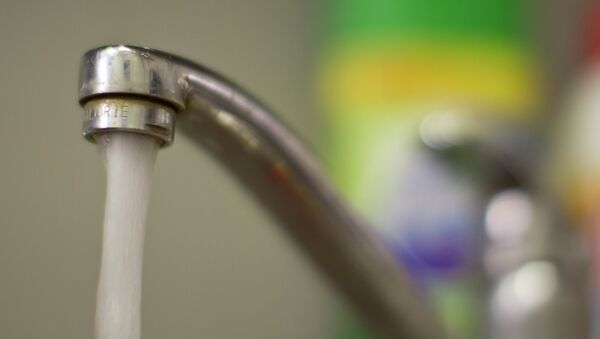WASHINGTON, October 18 (RIA Novosti) - US Detroit Water and Sewerage Department (DWSD) has not been able to figure out how to take water from the Detroit River and make it safe to drink and get it to residences for free, DWSD spokesman told RIA Novosti.
"Is water a human right? I think if you go down to the Detroit River with a bucket you can get as much water as you want, but if you want it pumped into your home at your tap, clean, safe and some of the best drinking water in the world… then that's not free," Public Affairs Group spokesman for DWSD, Gregory Eno said on Friday.
According to Eno, from January 1 through September 30, 2014, DWSD has shutoff water to 27,148 commercial and residential properties in Detroit.
"We don't want anybody, frankly, to be without water. That's always been our stance and continues to be. We only used shutoffs as a last resort," Eno explained.
For over a decade, DWSD has struggled to collect payments and keep the budget balanced. DWSD is now in debt to the tune of $5 Billion, and the City of Detroit has filed bankruptcy. This year, DWSD noticeably increased the number of shutoffs it performs to tackle the debt, according to Eno.
Eno explains, "We [DWSD] have a yearly revenue requirement we have to meet which is roughly $334 Million. We are non-profit, so we cannot charge folks anything other than what it costs us to provide the service."
"We don't get grants. We don't get funding from the feds, the state, or anybody else. We rely on people paying their bills, and when they don't pay their bills we fall short," said Eno.
Eno added, that DSWD have played its role in the aggravation of the current situation. "However, the bottom line is the money is still owed, whether we've been aggressive in the past in collecting it or not," he said.
The number of people on personal payment agreements is roughly 34,000. This program allows households to continue to receive water services by agreeing to make partial payments.
The United Nations (UN) Human Rights – Office of the High Commissioner for Human Rights will hold the "Detroit Fact-Finding Public Town Hall Meeting" on Sunday. The town hall will host internationally and locally known panelists who will hear testimony from Michigan residents on water, sanitation, and housing issues offered by crisis victims.
A declining population, increasing unemployment, and an estimated $18 Billion in debt have contributed to Detroit filing for bankruptcy in July 2013. The bankruptcy hearing is slated to resume on October 20.



